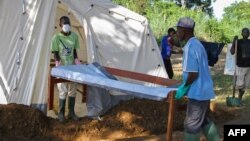The World Health Organization (WHO) warns heavy rains and flooding in the Democratic Republic of Congo may exacerbate the country’s ongoing cholera epidemic.
Rains last week triggered flooding and landslides in the capital, Kinshasa, causing 45 deaths and widespread damage. The WHO warns the flooding also is likely to worsen the cholera epidemic and other waterborne diseases.
The current outbreak, which began in last July, is one of the most severe in years. The WHO reports people in 24 out of 26 provinces have been infected with the disease. Latest reports find 55,000 cases, including nearly 1,200 deaths.
WHO spokesman Christian Lindmeier says this is almost twice the number of cases reported in 2016.
“The case fatality rate in general is just slightly over 2 percent. But, in some provinces, it is much higher. In four provinces, the case fatality rate is more than 5 percent and actually much larger sometimes,” he said.
Lindmeier added that in Kinshasa, the case fatality rate is 13 percent, in Kasai, 14.5 percent and in Tanganyika, just over 11 percent.
Rare aid recipient
The DRC rarely gets relief from humanitarian crises. Lindmeier told VOA that perpetual conflicts complicate efforts to respond adequately to the cholera epidemic.
“Given the circumstances, with the conflict, with lack of access, with displaced people, including now flooding - this is not unusual, unfortunately. This is a situation, which facilitates the spread of cholera and other waterborne diseases very badly and the conflict, of course, makes any sort of attempt to treat or to help the people worse,” Lindmeier said.
The Central African country has 4.5 million internally displaced people - the largest IDP population in Africa.
The WHO warns poor access to safe water and sanitation and poor hygiene practices are the main factors driving the latest cholera outbreak.




